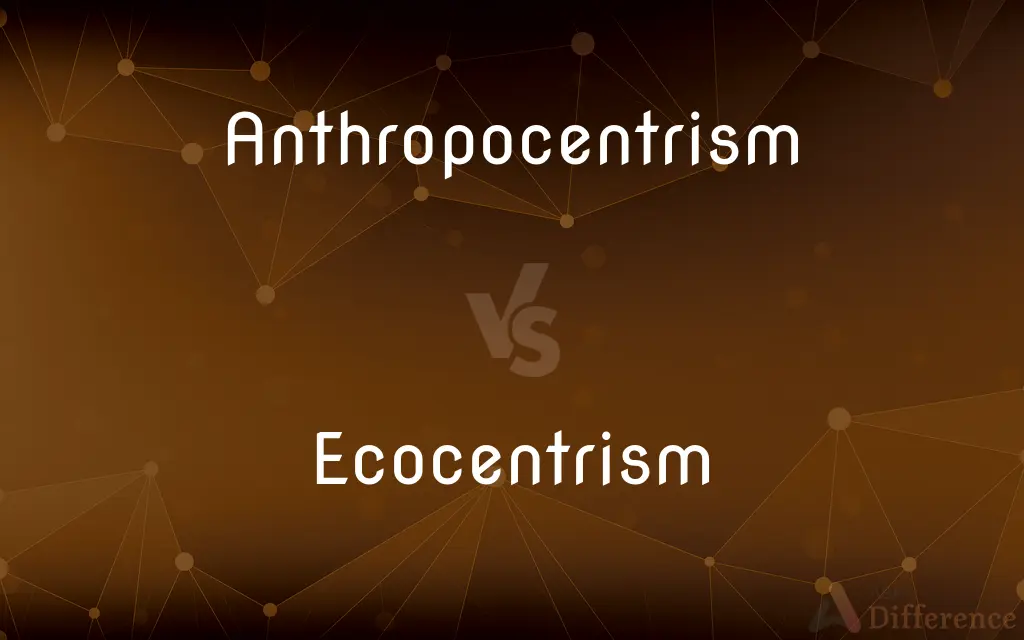Anthropocentrism vs. Ecocentrism — What's the Difference?
By Tayyaba Rehman & Fiza Rafique — Published on February 9, 2024
Anthropocentrism values humans above all, while ecocentrism values ecosystems and all life forms equally.

Difference Between Anthropocentrism and Ecocentrism
Table of Contents
ADVERTISEMENT
Key Differences
Anthropocentrism is a worldview that places humans at the center of consideration, valuing human needs and interests above other species and the environment. Ecocentrism, on the other hand, argues for the intrinsic value of all living beings and the ecosystems they inhabit, advocating for a nature-centered rather than human-centered approach to environmental issues.
In the context of environmental ethics, anthropocentrism supports the idea that nature should be preserved primarily for its utility to humans, whether for resources, aesthetic pleasure, or recreation. Ecocentrism challenges this view by promoting the preservation of nature for its own sake, emphasizing the interconnectedness of all life forms and the rights of non-human entities to exist and thrive.
Anthropocentric perspectives often lead to policies and practices that prioritize human benefit, potentially at the expense of ecological health and biodiversity. Ecocentric perspectives strive for sustainable solutions that ensure the well-being of entire ecosystems, recognizing that human health and prosperity are deeply intertwined with the health of the natural world.
The debate between anthropocentrism and ecocentrism is crucial in addressing global environmental challenges such as climate change, deforestation, and species extinction. While anthropocentrism may justify short-term exploitation of natural resources, ecocentrism advocates for long-term sustainability, urging a shift in how humans view and interact with the natural world.
Ultimately, the contrast between anthropocentrism and ecocentrism reflects differing beliefs about humanity's place in the natural order and the extent of our moral obligations to the environment. Moving towards a more ecocentric worldview could be key to resolving many of the environmental crises facing the planet today.
ADVERTISEMENT
Comparison Chart
Central Focus
Human interests and needs
Health of entire ecosystems
Ethical Consideration
Humans have higher moral status
All life forms have intrinsic value
Environmental Policy
Nature valued for human benefit
Nature preserved for its own sake
Approach to Nature
Utilitarian and resource-based
Holistic and interconnected
Response to Environmental Issues
Solutions often favor human convenience
Solutions prioritize ecological balance
Compare with Definitions
Anthropocentrism
Prioritizing human needs in environmental management.
The anthropocentric approach often leads to policies that overlook the impacts on wildlife.
Ecocentrism
A philosophy that centers nature in ethical decision-making.
Through an ecocentric lens, the preservation of wetlands is vital for maintaining ecological balance, not just for human benefit.
Anthropocentrism
The belief in human supremacy over nature.
Anthropocentrism drives the exploitation of natural resources without regard for ecological consequences.
Ecocentrism
Recognizing the intrinsic value of nature.
Ecocentrism leads to conservation strategies that respect the natural dynamics of ecosystems.
Anthropocentrism
The practice of assessing the natural world in terms of human values.
Anthropocentrism often underestimates the intrinsic value of ecosystems, focusing instead on their utility to humans.
Ecocentrism
The belief in the equal moral consideration of all elements of an ecosystem.
Ecocentrism supports rewilding projects to restore natural habitats and wildlife populations.
Anthropocentrism
Human interests as the ultimate ethical consideration.
Anthropocentrism justifies deforestation for urban development by valuing economic growth over forest preservation.
Ecocentrism
Valuing ecosystems and all life forms inherently.
Ecocentrism inspires policies that protect biodiversity for the sake of the ecosystem itself.
Anthropocentrism
Viewing environmental issues through a human-centric lens.
Anthropocentrism can result in conservation efforts that only consider human benefits.
Ecocentrism
Advocating for the rights of all living beings.
Ecocentrism opposes habitat destruction, emphasizing the interconnectedness of species.
Anthropocentrism
Regarding humans as the central element of the universe.
Ecocentrism
(political philosophy) A nature-centred, as opposed to human-centred, value system.
Anthropocentrism
Interpreting reality exclusively in terms of human values and experience.
Anthropocentrism
A viewpoint or theory that places human beings at the center of everything, giving preference to human beings above all other considerations.
Anthropocentrism
An inclination to evaluate reality exclusively in terms of human values.
Anthropocentrism
An inclination to evaluate reality exclusively in terms of human values
Common Curiosities
Why is ecocentrism considered more sustainable?
Ecocentrism is considered more sustainable because it advocates for the preservation of ecosystems and biodiversity, which are essential for long-term ecological balance.
What is ecocentrism?
Ecocentrism is an environmental perspective that places equal value on all living organisms and the ecosystems in which they live.
What is anthropocentrism?
Anthropocentrism is the viewpoint that human beings are the most important entities in the universe, prioritizing human needs and interests.
Can anthropocentrism lead to environmental harm?
Yes, anthropocentrism can lead to environmental harm by justifying the exploitation of natural resources for human benefit.
How does ecocentrism impact conservation efforts?
Ecocentrism impacts conservation efforts by promoting practices that protect and restore natural habitats and biodiversity for their own sake.
How do anthropocentric views influence policy-making?
Anthropocentric views often influence policy-making by prioritizing economic growth and human development over environmental protection.
How do anthropocentrism and ecocentrism differ in environmental ethics?
Anthropocentrism focuses on human welfare and benefits, while ecocentrism values the well-being of the entire ecosystem, including non-human elements.
How do anthropocentrism and ecocentrism view the role of humans in the environment?
Anthropocentrism views humans as the most important and central factor in considerations of the environment, while ecocentrism sees humans as one part of a larger ecological system.
How do anthropocentrism and ecocentrism affect biodiversity?
Anthropocentrism can sometimes threaten biodiversity through habitat destruction, while ecocentrism seeks to protect and enhance biodiversity.
What are the criticisms of anthropocentrism?
Critics of anthropocentrism argue that it leads to environmental degradation and overlooks the intrinsic value of non-human life.
Can a balance be found between anthropocentrism and ecocentrism?
A balance can be found by integrating sustainable human development with the preservation of natural ecosystems, recognizing the interdependence of humans and nature.
Can ecocentrism be applied in urban development?
Yes, ecocentrism can be applied in urban development through green infrastructure, sustainable design, and integrating natural elements into urban planning.
Are ecocentric principles widely accepted in environmental policy?
Ecocentric principles are gaining acceptance in environmental policy, but challenges remain in balancing human needs with ecological sustainability.
In what ways can ecocentrism influence lifestyle choices?
Ecocentrism can influence lifestyle choices by encouraging practices that reduce environmental impact and promote the well-being of all life forms.
How do individuals with anthropocentric views typically approach nature conservation?
Individuals with anthropocentric views may support nature conservation when it benefits human interests, such as for recreation or natural resources.
Share Your Discovery

Previous Comparison
Durga Puja vs. Dussehra
Next Comparison
C++ vs. OOPAuthor Spotlight
Written by
Tayyaba RehmanTayyaba Rehman is a distinguished writer, currently serving as a primary contributor to askdifference.com. As a researcher in semantics and etymology, Tayyaba's passion for the complexity of languages and their distinctions has found a perfect home on the platform. Tayyaba delves into the intricacies of language, distinguishing between commonly confused words and phrases, thereby providing clarity for readers worldwide.
Co-written by
Fiza RafiqueFiza Rafique is a skilled content writer at AskDifference.com, where she meticulously refines and enhances written pieces. Drawing from her vast editorial expertise, Fiza ensures clarity, accuracy, and precision in every article. Passionate about language, she continually seeks to elevate the quality of content for readers worldwide.
















































